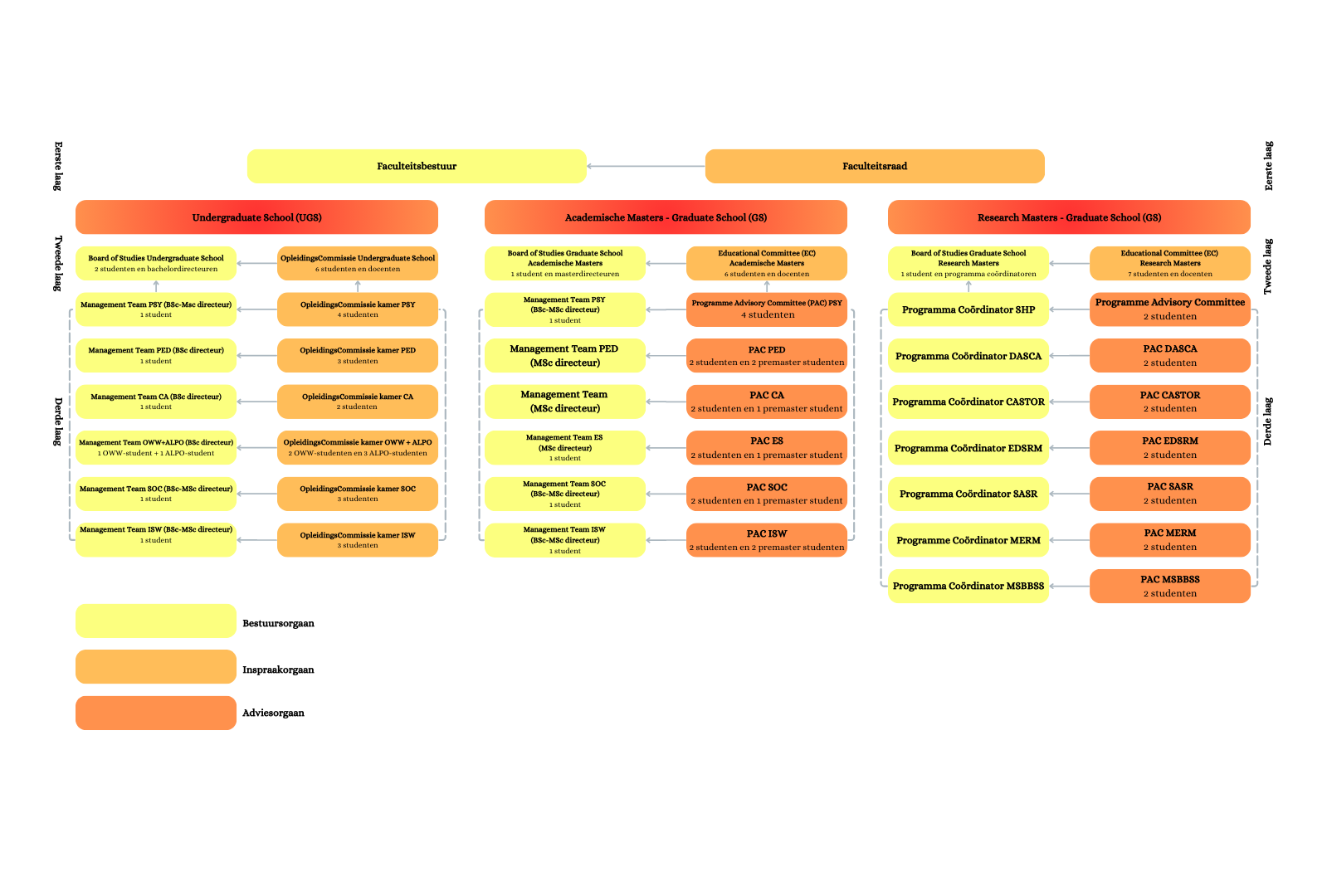General Structure
At the faculty, several Participation bodies are in place in which students represent their interests and monitor the quality of education. All Participation bodies consist of both students and staff members. Here, we will focus on the faculty-wide Participation bodies.
As you can see in the diagram below, there are three layers within the Participation. The top two layers deal with the faculty-wide Participation.

The top layer consists of the Faculty Board and the Faculty Council
The Faculty Board is the governing body; they make the final decisions about what happens within the faculty. This board includes one student member, namely the assessor.
The Faculty Council is the Participation body; they monitor the decisions of the Faculty Board and provide advice. The Faculty Council consists of 7 students who are elected every year by all students of the faculty. In this way, they represent the student perspective at the faculty level. Have you noticed something going wrong, or are you curious about how something is arranged for the whole faculty (so, for all programmes)? Then don’t hesitate to reach out to the current Faculty Council!
The second faculty layer consists of the Board of Studies Undergraduate and Graduate School (BoS UGS & GS) and the Programme Committee Undergraduate School and Educational Committees AcMa and ReMa (OC UGS and EC AcMa & ReMa).
The Board of Studies Undergraduate and Graduate School (BoS UGS & GS) is the governing body. They make decisions at the faculty level, specifically about education and organisational matters, such as timetabling or the use of ChatGPT. Meetings are held once a month and are attended by 2 bachelor student members, 2 master student members, the assessor, the vice-deans, faculty policy officers, and the bachelor’s and master’s directors. These student representatives are the student members of the Management Teams of their own programmes (more about this can be found on the programme-specific Participation page). Through a preparatory meeting, all student members from the programmes can discuss educational matters and what these mean for their programme.
The Programme Committee Undergraduate School (OC UGS) is the Participation body. They monitor the decisions of the Board of Studies Undergraduate School and provide advice. Whereas the Board of Studies focuses strongly on the organisation of education at the faculty level, the OC UGS places more emphasis on the quality of education—such as course evaluations and workload among students and staff. The OC UGS also has a preparatory meeting where all student members of the Programme Committees can exchange views on quality-related matters and what they mean for their programme. Unlike the Board of Studies Undergraduate and Graduate School, in the OC UGS all student representatives are present to represent their own programme.
The Educational Committees (EC): there is one EC for the one-year academic master’s programmes (EC AcMa) and one for the two-year research master’s programmes (EC ReMa). The EC AcMa consists of 6 students and staff members, and the EC ReMa consists of 7 students and staff members. Like the BoS UGS & GS and the OC UGS, this is an inter-programme body. The EC advises the BoS and, in addition, also has the right of consent.
Participation Coordinators
Finally, there are the Medezeggenschapscoördinatoren (MeCos) (Participation Coordinators). They are not included in the diagram, since they are technically not part of the Participation. However, they organise many things for the Participation, such as the meetings for each programme and the preparatory meetings for the faculty-wide bodies. In addition, they are responsible for recruiting and training Participation members and for promoting Participation. They are therefore mainly there to support the Participation members and are less involved in substantive matters.

